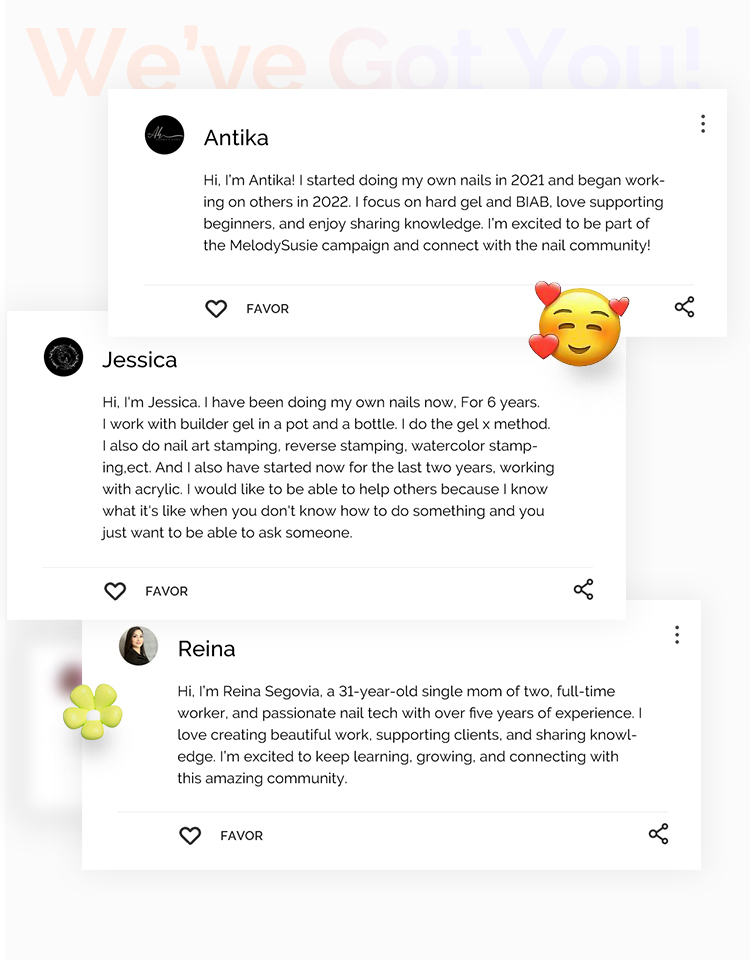Hey nail newbies and DIY nail enthusiasts! ✨✨✨
Struggling with nail questions or difficulties and not sure who to ask? Searching online not cutting it? We get it - that’s why MelodySusie is bringing in experienced manicurists (with 3+ years of expertise!) to answer your questions directly.

Here's how it works:
· Drop your nail-related questions in the comments below.
· Our pros will provide expert advice to help you out.
Plus, to celebrate the launch of our new PocketNail Nail Drill, we're giving away prizes! 🎉🎉
· We'll randomly select 20 participants who ask questions to win a PC100GR Nail Drill.
Time: May 20th - May 26th, PST

For the best answers and higher chances of winning, use the 3W format:
· What's the problem?
· What have you tried?
· What's your goal?
Example: "My gel polish peels off quickly. I've tried using a primer, but it didn't work. How can I make it last longer?"
Providing details helps our manicurists give precise solutions and boosts your winning odds!
Don’t miss out on expert advice and awesome prizes! Ask your questions now! ⬇️
#MelodySusie#PocketNail#Giveaway#NailHelp#beginner#DIYNails
Here are the winners:
XD
Pinkywhite15
cycycy
dddd
PumpkinPixie
Dita
Sabriiiiiina
V.L
Enda
jellyfish
linlee99
Dijona
anastasiia.nails.nls
Hhhhey
Melanie Nguyen
Selena
VIVIAdorable
Amirthavaarshini
Sokäch
Eiei
We will be reaching out to the winners via email within the next 2 days. Please keep an eye on your inbox! 📧
Thank you to everyone who participated and shared their enthusiasm for nails. Stay tuned for more exciting campaigns in the future!
Thank you so much for your questions, I hope we could help you! 🙈
For natural nail prep, I use medium diamond bits, but if you’re a beginner, definitely stick to fine bits first until you get a good feel for the e-file.
To roughen/ buff the natural nail, I now also use a 180-grit mini mandrel, but when I started, I only used 240 grit.
I attached pictures of the diamonds bits I use.
First I go in with the flame bit, then the other one.
🔴 Red = Fine
🔵 Blue = Medium
I do a manicure, use dehydrator, primer, Base and Hard Gel but it doesn’t last 3-4 weeks…
I’ve had a few clients come in with noticeably sweaty hands, and at first, I struggled with retention. I was doing all the right prep—pushing back cuticles, buffing the nail, applying dehydrator and primer—but I noticed a difference when I changed how I applied the primer.
Now, I apply the primer finger by finger—meaning I apply it and immediately follow with the product on that same nail, instead of priming all nails at once. The first time I switched to this method, I’ll admit I forgot to apply primer on a couple nails here and there 😅—it definitely takes a little getting used to! But once I got the hang of it, it made such a big difference.
Also, make sure the nail plates aren’t being touched by your face, fingers, or anything else before application—keeping them clean and uncontaminated really helps with adhesion too! I really hope this helps. Try it out and let me know 🫶🏼🫶🏼
To minimize air bubbles in builder gel, avoid vigorously shaking or agitating the gel in its container, pick up the gel gently with a brush, and apply it in thin, even coats. If bubbles still appear, massage the area gently with your brush to work them out.
Detailed Explanation:
1. Gentle Handling:
Avoid Shaking: Shaking the builder gel bottle can introduce air bubbles into the product, making them more likely to appear during application.
Gentle Picking: When picking up builder gel with your brush, do it slowly and carefully. Avoid creating excessive pressure or dragging the brush across the surface of the gel.
Brush Technique: Use a slight, angled brush movement to pick up the gel, rather than a circular motion.
2. Application Technique:
Thin Layers: Apply builder gel in thin, even coats to avoid trapping air bubbles.
Massage Bubbles: If bubbles do appear, use your brush to gently massage the area around the bubble, working it out from the gel.
3. Product Freshness and Storage:
Check Shelf Life: Ensure your builder gel is not expired, as older products may be more prone to bubbling.
Proper Storage: Store your builder gel in a cool, dark place to help maintain its consistency and prevent premature hardening.
4. Additional Tips:
Warm Up the Gel: If you find the gel is thick and difficult to work with, you can gently warm the bottle by rolling it in your hands or placing it in warm water.
Clean Your Brushes: Use clean, dry brushes to avoid transferring debris or moisture into the builder gel.
By following these guidelines builder gel application.
I hope these help you out and I can't wait to see. The beautiful nails that you will create with builder gel in the future4
Moisture makes it harder for products to bond well, causing faster lifting.
✨ Tips:
• Use a good dehydrator and double-prime in summer
• Keep your workspace cool and dry
• Cure nails thoroughly
Also, even after your appointment, make sure nails stay dry and cool because sweat or moisture afterward can cause lifting too 🙈
At the beginning of my nail journey it was so hard to try to do a french tip!! I have tried it so many ways!!! Melody susie has this new brush liner set and so far that is my favorite liner brush! First you want to start off with the lines down the sidewalls then the bottom line following the free edge. This one will depend on how thick you want your french to be the thicker the higher you would put it. Once i know how thick i want my french i do that straight line on all fingers so i can stick to drawing a somewhat similar french on each finger. Then we curve the sidewalls a little inward and then do the curve. This takes a lot of patience and practice so dont give up on the first try. Practice makes permanent so keep trying!! I love when my clients now come in and ask for a french ser! ☺️ hope this helps🫶🏼🫶🏼
The first photo (black & white set) was shaped before builder gel — that was one of my first sets.
The second (yellow French with flowers) was filed after — way crispier, right?
I always do a rough shape first, then file to perfection once the gel is cured. Game changer! ✨
✨ Hand files (for personal use):
Replace them when they stop filing efficiently, feel smooth, or the grit looks worn down.
**For pros: use single-use files or one per client (labeled and stored separately).
✨ E-file bits:
Depends on how often you use them. For regular use, every 2–3 months is a good rule, but watch for signs like:
• Bit doesn’t remove product as fast
• Creates more heat/friction
• Looks dull or uneven
Diamond and carbide bits last longer, but they still need replacing eventually. Clean regularly to avoid buildup, and always replace at the first sign of rust or damage!
I have yet to try anything but I was thinking about using an etching polish. I’m still new to doing my own nails and understand that skipping the buffing, may cause my nails to only last maybe 2 weeks.
It’s understandable to be cautious about buffing your natural nails, especially when you’re just starting out with press-ons or Gel-X extensions. The short answer is yes some kind of surface prep is necessary for long-lasting adhesion, but it doesn’t always have to be aggressive buffing. The reason buffing is recommended is to remove shine and create a slightly rough surface so the gel or tip adheres better, but over-buffing can definitely thin out and damage your nail plate if you’re not careful.
Since you mentioned etching polish, that’s actually a smart alternative. Etching solutions or dehydrators (like those made for soft gel or Gel-X systems) chemically prep the surface by removing oils and slightly roughening the top layer without abrasives. You can pair that with a gentle swipe of alcohol or acetone to fully clean the nail before applying tips. If you’re really set on skipping the buffing altogether, just be aware that the wear time might be a bit shorter—usually around 1–2 weeks instead of 3+. And with the right prep products and a solid application, you can still get great results while keeping your natural nails healthy. Just take your time, go easy on your nails, and you’ll find what works best for you. Hope this helps ❤️
Totally get how you feel!
Being cautious is smart at first, but it can slow you down. When removing hard products like acrylic or gel, most techs work between 25,000–35,000 RPM depending on the bit and product thickness.
If you’re only at 15K and your drill is overheating, it might be working too hard - which also makes it less stable.
✨ A few tips to feel more confident:
• Use a coarse ceramic or carbide bit for bulk removal
• Let the bit do the work - you don’t need to press down
• Practice on tips to get used to speed and pressure
• Support your hand and wrist for more control
• Heat cannot buildup if you keep the bit moving!
• Practice by gradually increasing your speed
It takes time, but confidence grows with every set you do! 💗